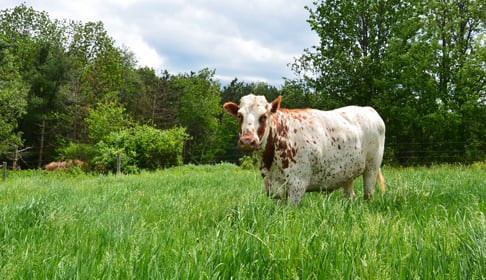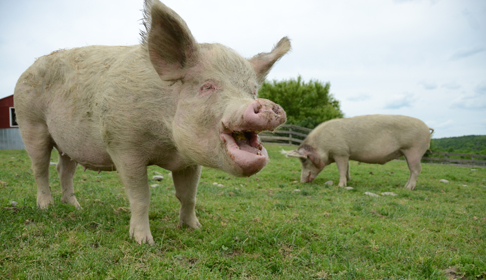By Bruce Friedrich, Director of Policy and Advocacy
People have become increasingly aware that virtually all of the 9 billion land animals slaughtered in the United States each year for their meat are terribly mistreated. In fact, routine farming practices are so abusive that they would warrant felony animal cruelty charges if they were done to cats or dogs.

As a result, more and more compassionate people have joined the ranks of those who choose to eat a vegan diet. Some, however, have looked instead to meat from animals treated less badly, which is often stamped with a “humane certified,” or other such label, and may be referred to as “humane meat.”
This raises two questions in my mind. First, is there such a thing as truly “humane meat”? And second, even if we agree that some meat involves better conditions than conventional meat, should animal advocates promote it? I will address both questions in turn.
Is there such a thing as humane meat?
Let’s pose a question: Would you be willing to eat “humanely raised dog meat” or “humanely raised cat meat”?
I suspect not, and yet there is no rational difference between eating a dog or a pig, a cat or a chicken. All of these species are made of flesh, blood, and bone. And they have interests and personalities, as everyone who has spent time at Farm Sanctuary knows so well.
In fact, scientists have shown that pigs and chickens outperform dogs and cats on scientific tests of behavioral and cognitive sophistication. For the same reason that there is no such thing as humane dog meat, there is also no such thing as humane chicken, pork, or beef. Simply put, killing an animal in order to eat her cannot be called humane.
Let’s pose a second question: Would you be willing to cut an animal’s throat? For most of us, taking an animal’s life is abhorrent; we just wouldn’t do it. Of course, all of us could spend an afternoon participating in every aspect of getting plants to the table — picking them, packaging them, etc. But there is no aspect of slaughtering animals that is similarly pleasant, no aspect that any of us would enjoy doing.

If you’re like most people, you would not slice open a chicken’s throat for something as inconsequential as a meal. But this is precisely what we’re doing if we’re eating meat. Although we’re not personally killing the animal, we are paying someone to do it for us. And if we wouldn’t do it ourselves — if we wouldn’t even want to watch it — we should ask ourselves, where is the basic integrity in paying someone to do something we are opposed to?
Should animal advocates promote “humane meat”?
We should also understand that our decisions can have a strong impact on other people, and our decision to eat any meat at all (even if the meat is from producers that are less abusive) may influence others to eat factory farmed meat.
I’ve been a vegan for 27 years, and, in that time, I’ve convinced many friends and acquaintances to follow my lead. Each one of these individuals saves just as many animals through their veganism as I do through mine. Every person I convince to choose a plant-based diet increases my lifetime impact as a vegan.
But the reverse is also true: By not advocating veganism, all of those animals who could have been saved will instead suffer terrible lives and die horrible deaths.
Most people observing someone eating “humane” meat simply see a fellow meat-eater. They are not likely to change their own diets, because what they see is simply meat. Beyond that, eating “humane” meat is far more difficult than eating a vegan diet. Every restaurant in the country has something for vegans to eat, and it’s almost always cheaper than the meat-based alternatives. The vast majority of cities don’t have even a single restaurant that serves meat from animals who have not been factory farmed.
Obviously, working for improved living and dying conditions for farmed animals is a critical element in the animal rights movement. We should be fighting to ban gestation crates and battery cages. We should be working to ensure that the Humane Slaughter Act is properly enforced. The vast majority of Americans explicitly support banning abusive systems and decreasing abuse at slaughter, and we should strive to align our laws with our national values.
It’s important for the animals involved that we take steps toward ending the cruelty they endure every day. We cannot ignore the animals who are currently suffering.
But for anyone who truly cares about animals, veganism is the only choice that aligns our values — our opposition to cruelty and killing — with our actions.
It’s not that much to ask, and lives are depending on us.


